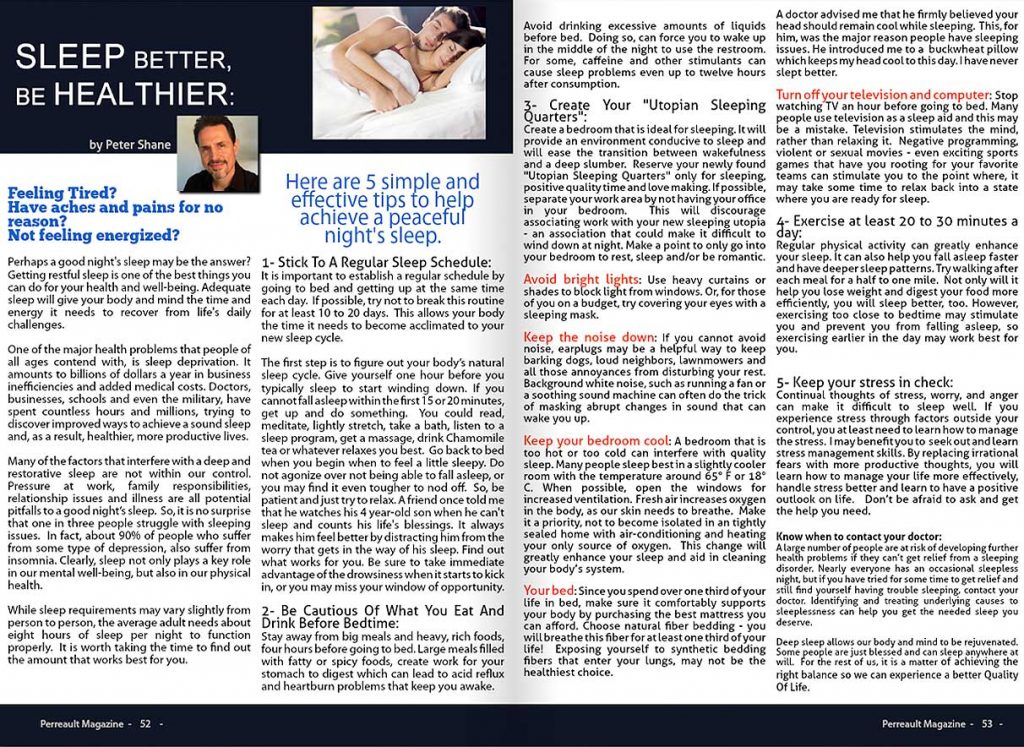Sleep Better, Be Healthier:
Feeling Tired?
Have aches and pains for no reason?
Not feeling energized?
Perhaps a good night’s sleep may be the answer? Getting restful sleep is one of the best things you can do for your health and well-being. Adequate sleep will give your body and mind the time and energy it needs to recover from life’s daily challenges.
One of the major health problems that people of all ages contend with is sleep deprivation. It amounts to billions of dollars a year in business inefficiencies and added medical costs. Doctors, businesses, schools and even the military have spent countless hours and millions of dollars trying to discover improved ways to achieve a sound sleep and as a result healthier, more productive lives.
Many of the factors that interfere with deep and restorative sleep are not within our control. Pressure at work, family responsibilities, relationship issues, and illness are all potential pitfalls to a good night’s sleep. So, it is no surprise that one in three people struggle with sleeping issues. In fact, about 90% of people who suffer from some type of depression, also suffer from insomnia. Clearly, sleep not only plays a key role in our mental well-being but also in our physical health.
While sleep requirements may vary slightly from person to person, the average adult needs about eight hours of sleep per night to function properly. It is worth taking the time to find out the amount that works best for you.
Here are 5 simple and effective tips to help achieve a peaceful night’s sleep.
1- Stick To A Regular Sleep Schedule:
It is important to establish a regular schedule by going to bed and getting up at the same time each day. If possible, try not to break this routine for at least 10 to 20 days. This allows your body the time it needs to become acclimated to your new sleep cycle.
The first step is to figure out your body’s natural sleep cycle. Give yourself one hour before you typically sleep to start winding down. If you cannot fall asleep within the first 15 or 20 minutes, get up and do something. You could take Herbwell’s Sleep Tight, read, meditate, lightly stretch, take a bath, listen to a sleep program, get a massage, drink chamomile tea, or whatever relaxes you best. Go back to bed when you begin when to feel a little sleepy. Do not agonize over not being able to fall asleep, or you may find it even tougher to nod off. So, be patient and just try to relax. A friend once told me that he watches his 4-year-old son when he can’t sleep and counts his life’s blessings. It always makes him feel better by distracting him from the worry that gets in the way of his sleep. Find out what works for you. Be sure to take immediate advantage of the drowsiness when it starts to kick in, or you may miss your window of opportunity.
2- Be Cautious Of What You Eat And Drink Before Bedtime:
Stay away from big meals and heavy, rich foods, four hours before going to bed. Large meals filled with fatty or spicy foods, create work for your stomach to digest which can lead to acid reflux and heartburn problems that keep you awake.
Avoid drinking excessive amounts of liquids before bed. Doing so, can force you to wake up in the middle of the night to use the restroom. For some, caffeine and other stimulants can cause sleep problems even up to twelve hours after consumption.
3- Create Your “Utopian Sleeping Quarters”:
– Create a bedroom that is ideal for sleeping. It will provide an environment conducive to sleep and will ease the transition between wakefulness and deep slumber. Reserve your newly found “Utopian Sleeping Quarters” only for sleeping, positive quality time, and love-making. If possible, separate your work area by not having your office in your bedroom. This will discourage associating work with your new sleeping utopia – an association that could make it difficult to wind down at night. Make a point to only go into your bedroom to rest, sleep and/or be romantic.
– Avoid bright lights: Use heavy curtains or shades to block light from windows. Or, for those of you on a budget, try covering your eyes with a sleeping mask.
– Keep the noise down: If you cannot avoid noise, earplugs may be a helpful way to keep barking dogs, loud neighbors, lawnmowers and all those annoyances from disturbing your rest. Background white noise, such as running a fan or a soothing sound machine can often do the trick of masking abrupt changes in sound that can wake you up.
– Keep your bedroom cool: A bedroom that is too hot or too cold can interfere with quality sleep. Many people sleep best in a slightly cooler room with the temperature around 65° F or 18° C. When possible, open the windows for increased ventilation. Fresh air increases oxygen in the body, as our skin needs to breathe. Make it a priority, not to become isolated in an tightly sealed home with air-conditioning and heating your only source of oxygen. This change will greatly enhance your sleep and aid in cleaning your body’s system.
– Your bed: Since you spend over one third of your life in bed, make sure it comfortably supports your body by purchasing the best mattress you can afford. Choose natural fiber bedding – you will breathe in this fiber for at least one third of your life! Exposing yourself to synthetic bedding fibers that enter your lungs, may not be the healthiest choice. A doctor advised me that he firmly believed your head should remain cool while sleeping. This, for him, was the major reason people have sleeping issues. He introduced me to a buckwheat pillow which keeps my head cool to this day. I have never slept better.
– Turn off your television and computer: Stop watching TV an hour before going to bed. Many people use television as a sleep aid and this may be a mistake. Television stimulates the mind, rather than relaxing it. Negative programming, violent or sexual movies – even exciting sports games that have you rooting for your favorite teams can stimulate you to the point where, it may take some time to relax back into a state were you are ready for sleep.
4- Exercise at least 20 to 30 minutes a day:
Regular physical activity can greatly enhance your sleep. It can also help you fall asleep faster and have deeper sleep patterns. Try walking after each meal for a half to one mile. Not only will it help you lose weight and digest your food more efficiently, you will sleep better, too. However, exercising too close to bedtime may stimulate you and prevent you from falling asleep, so exercising earlier in the day may work best for you.
5- Keep your stress in check:
Continual thoughts of stress, worry, and anger can make it difficult to sleep well. If you experience stress through factors outside your control, at least learn how to manage the stress. It may benefit you to seek out and learn stress management skills. By replacing irrational fears with more productive thoughts, you will learn how to manage your life more effectively, handle stress better and learn to have a positive outlook on life. Don’t be afraid to ask and get the help you need.
6 – Know when to contact your doctor:
A large number of people are at risk of developing further health problems if they can’t get relief from a sleeping disorder. Nearly everyone has an occasional sleepless night, but if you have tried for some time to get relief and still find yourself having trouble sleeping, contact your doctor. Identifying and treating underlying causes to sleeplessness can help you get the needed sleep you deserve.
Deep sleep allows our body and mind to be rejuvenated. Some people are just blessed and can sleep anywhere at will. For the rest of us, it is a matter of achieving the right balance so we can experience a better Quality Of Life.



